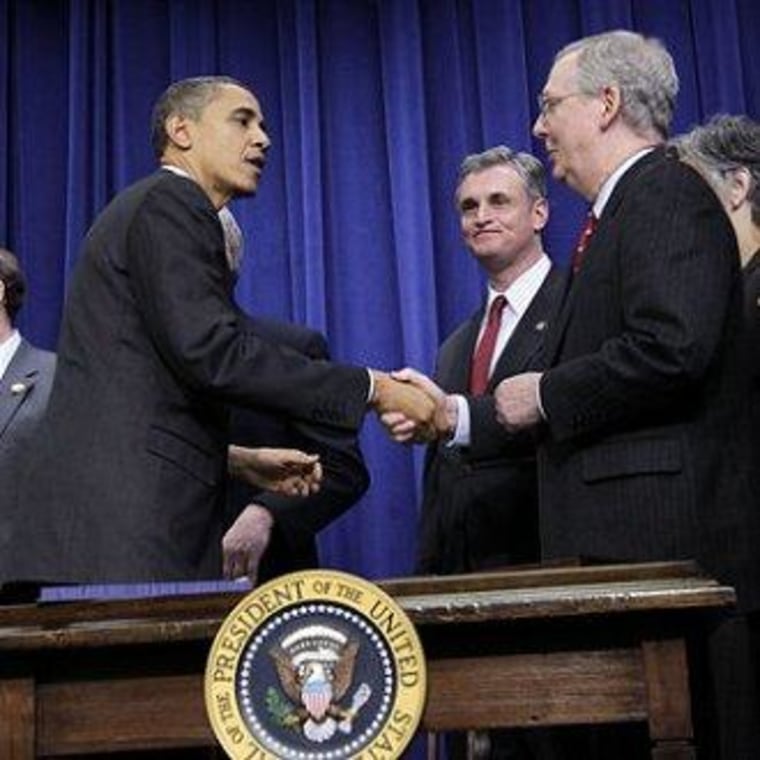It took considerable effort, and it's filled with provisions that are already drawing plenty of criticisms, but Senate leaders and the White House have reached a bipartisan agreement on the looming fiscal deadlines that have been the subject of months of controversy.
Of course, the deal may be finished, but that doesn't mean it will be approved, and it certainly doesn't mean the entire process will be completed in the next hour.
Furious last-minute negotiations between the White House and the Senate Republican leadership on Monday secured a tentative agreement to allow tax rates to rise on affluent Americans, but the measure was not going to pass in time for Congress to meet its Dec. 31 deadline for averting automatic tax increases and spending cuts deemed a threat to the economy.While some senators pushed for a quick vote on legislation to avoid the so-called fiscal cliff, the House was not expected to consider any deal until Tuesday at the earliest, meaning that a combination of tax increases and spending cuts would go into effect in the first days of 2013. If Congress acts quickly and sends a deal to President Obama, the economic impact could still be very limited.
Vice President Biden, who played a central role in the talks, is meeting with Senate Democrats now, in the hopes of securing a sufficient number of votes. If there's a broad consensus in the caucus, we may yet see a vote in the upper chamber this evening.
Most important are the policies that make up the deal, and it appears to be largely consistent with what we'd heard throughout the day, including lower rates applying to income up to $450,000 and a one-year extension for unemployment benefits.
Of particular interest is what isn't in the package: there's no debt-ceiling increase, no new stimulus spending, and as it turns out, no spending cuts, either. What about the automatic sequestration cuts? The White House wanted a one-year postponement, but only secured a two-month break.
And you know what that means: by the end of February, President Obama and Congress will be expected to reach another agreement on offsetting the costs of the sequester, just as the nation reaches its next debt-ceiling deadline.
But let's not get ahead of ourselves. This deal hasn't passed yet, and we can't get to the next crisis until we've completely moved past this one.
The House is not expected to vote on the Senate deal tonight, and it's unclear how much support the agreement can receive in the lower chamber. House Minority Leader Nancy Pelosi has reportedly extended her support to the compromise, though it may yet prove challenging to cobble together 218 votes between the two parties' caucuses.
House Speaker John Boehner, as best as I can tell, has said very little today and has not yet responded to the Senate breakthrough, though if recent history is any guide, it probably wouldn't much matter what he had to say given how little influence he has in the House.
In other words, taken together, we don't know for certain that this deal will pass the Senate, and to assume that the House will quickly endorse the agreement is, at best, premature.
For now, however, an agreement has been reached in the Senate, and we can expect a vote fairly soon. As for the bigger picture -- who "won" the negotiations, which side's concessions matter more, who'll benefit, what this means for the economy, what this means for the next round of talks -- I'll have more coverage tomorrow.
Update: As of 10:54 p.m., Senate Majority Leader Harry Reid said he expects a vote before midnight, and he expects the Senate to approve the deal.
Another Update: As of 10:58 p.m., senators still wanted to hear from the CBO about the fiscal impact of the package, and as it turns out, there are still some folks working this evening in the CBO office.
